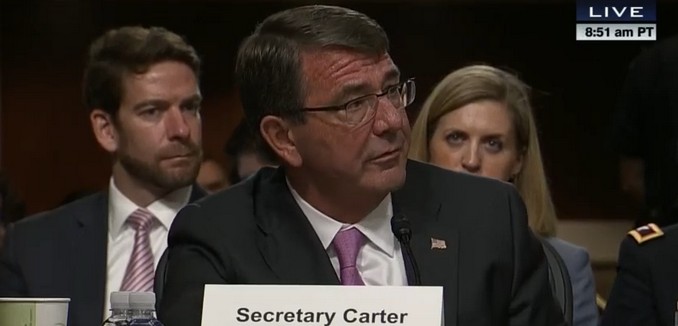In an exchange yesterday at a Senate Armed Forces Committee hearing, Sen. Lindsey Graham asked Secretary of Defense Ashton Carter if he thought that Syrian President Bashar al-Assad would remain in power after President Barack Obama leaves office, Foreign Policy reported.
Sen. Lindsey Graham (R-S.C.) — who is also running for the Republican nomination for president in 2016 — hit Defense Secretary Ash Carter with an uncomfortable question during the Pentagon chief’s testimony before the Senate Armed Services Committee on Tuesday. And Carter, who has never been a politician, answered honestly.
“What’s more likely?” Graham asked by way of slamming the White House for its policy of not doing more to oust the regime of dictator Bashar al-Assad in Syria. “President Obama leaves office in 2017, or Assad goes first?”
Carter got right to it. “Well, it — it’s certain that President Obama will leave,” he answered. After a bit of cross-talk, Graham decided that he wanted to hear that again. “Who leaves first, Obama or Assad?”
Carter then walked back his comment, saying that he hoped it would be Assad who would leave power first.
The exchange takes place starting at 3:10 in the video embedded below.
During the exchange, Graham pressed Carter on how the United States was acting to remove Assad from power. Graham said that he’d heard that regional allies would be willing to commit troops to fight against Assad if the United States would target the Syrian dictator militarily. Carter responded that America’s strategy was to have Assad removed politically, not militarily.
In January, The New York Times reported that the United States informed Assad through intermediaries that it was arming rebels to fight the Islamic State of Iraq and Syria (ISIS), but not targeting him. Last month, a rebel group threatened to quit the American-led anti-ISIS coalition over the restriction against targeting Assad.
Earlier this week, Tony Badran, a research fellow at the Foundation for Defense of Democracies, observed, “Though Obama’s policy has long recognized this Iranian zone of influence in Syria tacitly, the administration is increasingly signaling this recognition publicly.”
[Photo: C-SPAN ]




